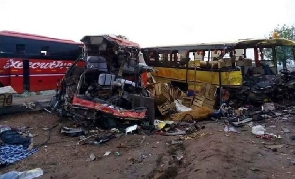N-Gas, the main supplier of gas to Ghana’s Volta River Authority (VRA), through the West African Gas Pipeline (WAGP), has shut down supply due to the indebtedness of over $166.3 million.
The supply was disconnected since Friday, June 17, 2016, according to a letter sent to VRA to inform them of the action.
This explains the intensified power cuts since Friday as the 200MW Sunon Asogli Power Plant, which uses only gas, has been shut down as a result of the shutdown by N-Gas.
Documents sighted by The Finder indicate that outstanding N-Gas invoices for gas supplied from August 2014 to March 30, 2016, amount to $166.3 million ($166,374, 079.73).
This paper learnt N-Gas is demanding full payment before supply will be restored.
Information gathered by this paper revealed that off-peak schedule capacity as of yesterday was 1,473 megawatts while demand was 1,687 megawatts.
Consequently, Ghana imported 150 megawatts of power from Cote d’Ivoire.
180 megawatts shed yesterday
Despite the import, off-peak load shedding of 180 megawatts was carried out, but that did not affect industries and Northern Electricity Distribution Company (NEDCo) operational areas.
Information gathered by The Finder indicates that Ghana Gas flow rate at Aboadze power enclave is 55.59 million standard cubic feet of gas per day as of yesterday.
Hydro sources at low levels
As of yesterday, the water level in Akosombo Dam was 235.82 feet while that of Bui Dam was 168.34m.
Energy experts say but for the low level of the Akosombo Dam, there would have been enough dependable capacity to eliminate the threat of load shedding completely.
Estimates indicate that more than US$1.18 billion is needed this year to buy fuel required to fire thermal power plants in order for the country to meet its electricity demands.
Out of this amount, $494 million will be required to procure natural gas for the various thermal plants.
VRA owes banks $1.53 billion
As of March 30 this year, VRA owed banks to the tune of over $1.53 billion, and it will be very difficult for VRA to secure a loan from any bank in Ghana to pay its debt to N-Gas.
The debt covers the cost of purchasing Light Crude Oil (LCO), lean gas, as well as long- and medium-term facilities and trade liabilities/overdrafts.
The breakdown of the amount are outstanding bill for light crude oil - $896 million ($896,589,888.13); outstanding bill for gas invoices - $530 million ($530,998.937.66); short-term facilities - $33.68 million; medium-term facilities - $120 million; and other trade liabilities/overdrafts - $78.531 million.
Govt must bail out VRA
This means the Government of Ghana, which is the 100% owner of VRA, will have to look for money to bailout VRA to enable it to settle the debts.
The cut in crude oil production output from the Jubilee field by over 50% as a result of faulty turret bearing on the Floating Storage and Offloading vessel (FPSO) Kwame Nkrumah has fuelled a rise in LCO import to fire thermal plants.
Consequently, experts believe that VRA’s debt would hit $2 billion by the end of this year even though VRA’s assets are not worth $2 billion.
This threatens the very existence of VRA.
$246.3m Ghana Gas debt
Also, as of December 2015, VRA owed the Ghana National Gas Company (GNGC) $246.3 million ($246,342,879.15).
Causes of VRA’s debts
VRA’s power generation problems are a sign of the budgetary stress facing the country.
A fall in supply from hydro sources, government underpayment to the Electricity Company of Ghana, residents’ illegal consumption, and tariffs too low for VRA to recoup its costs are the factors that have plunged the country into darkness.
The indebtedness is the result of the failure of the Electricity Company of Ghana (ECG), Independent Power Producers (IPPs) and the Volta Aluminum Company (VALCO) to pay VRA for services rendered, as well as the unrealistically low tariffs sanctioned by the Public Utilities Regulatory Commission.
Power Purchase Agreement
Even though ECG has signed a power purchase agreement with IPPs, it has failed to do same with VRA despite persistent pressure from VRA in the last five years.
One of the reasons ECG has persistently failed to sign the power purchase agreement is a clause in the agreement which demands that ECG pays outstanding debts with interest.
ECG argues that consumers of electricity do not pay outstanding debts with interest; therefore, it cannot do so to VRA.
For this reason, ECG usually pays IPPs first before considering paying VRA and Ghana Grid Company (GRIDCo).
Also, consumers pay ECG in cedis but ECG has to pay IPPs the dollar equivalent of power purchased using the prevailing exchange rate as stated in the power purchase agreement.
This, the sources said, takes a large chunk of ECG’s money, for which reason ECG is unable to settle its debt to VRA since about 40% of the power ECG purchases goes to government institutions, which do not pay bills.
Audited accounts of ECG indicate that as of the end of 2014, the government owed ECG GH?1 billion out of the GH?1.6 billion debt on the company’s books.
Despite the huge indebtedness, VRA cannot cut supply to ECG because of its strategic nature.
Fuel for IPPs
In addition, VRA supplies fuel to all IPPs in the country.
However, the IPPs have failed to pay for the fuel with the explanation that ECG has not paid them in full, and since ECG and VRA are state institutions, VRA should collect the fuel money from the money ECG owes them.
Despite this challenge, VRA continues to supply the IPPs fuel because failure to do so would result in huge deficits in the power supply.
Consequently, VRA has borrowed money from numerous banks just to keep generating power for the nation.
Now, most of the banks are reluctant to lend to VRA because of the huge indebtedness.
WAPCo shareholding structure
The International Project Agreement (IPA), signed in May 2003 by WAPCo and the governments of Benin, Ghana, Nigeria and Togo, with the secretariat of the Economic Community of West African States (ECOWAS) as witness, provides that N-Gas be allocated a space in the pipeline that could transport up to 200 million standard cubic feet of gas per day.
WAPCo is owned by Chevron West African Gas Pipeline Ltd (36.9%); Nigerian National Petroleum Corporation (24.9%); Shell Overseas Holdings Limited (17.9%); and Takoradi Power Company Limited (16.3%), Societe Togolaise de Gaz (2%) and Societe BenGaz S.A. (2%).
N-Gas shareholding structure
N-Gas is a company jointly owned by Nigerian National Petroleum Corporation (NNPC), Shell Petroleum Development Company (SPDC) and Chevron Nigeria Limited,
The company, which is jointly owned by Shell, Chevron, and the NNPC, buys gas from oil companies in Nigeria and transports the gas to its customers in Benin, Togo and Ghana, through the $1 billion WAGP, which is operated by the West African Gas Pipeline Company (WAPCo).
Business News of Tuesday, 21 June 2016
Source: thefinderonline.com













